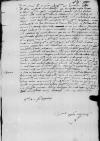Letter #1905
Ioannes DANTISCUS to Tiedemann GIESEHeilsberg (Lidzbark Warmiński), 1538-08-16
English register:
Dantiscus is pleased the rochet he sent is the right size; he does not know who used it previously, but it was definitely not Bishop Mauritius [Ferber], for whom it would have been too short; he is sending a tailor with a dalmatic and a tunicle in the same size. If Giese should find them too old-fashioned, they can serve as a pattern for making new ones. Neither the Ermland (Warmia) nor the Kulm (Chełmno) bishopric has any other pontifical vestments.
Dantiscus recounts his correspondence with Alexander [Sculteti] about sending away the concubine together with the bastards. Sculteti wrote something completely different to Dantiscus than to Giese. He thinks the cause of Dantiscus’ anger is the accusation he hurled against [Stanisław] Hozjusz (Hosius). He has asked that the matter be left until they meet, but he does not intend to renounce his right. If there is a confrontation, Dantiscus is determined to use his power.
They will discuss a convenient time and place for [Giese’s] consecration during the Graudenz (Grudziądz) Diet of Royal Prussia.
After sealing the letter, Dantiscus received a new letter from Giese. He agrees with his advice to move the autumn Diet to springtime due to the plague. He regrets he was unaware of the situation two days earlier when he was sending out his messenger [to the royal court]. He asks Giese to prepare their joint letter on the matter to the King [Sigismund I Jagiellon] and to get the [Royal Prussian] voivodes to place their seals under it. He cannot deal with it himself because he is about to set off on a tour of the diocese to receive an oath of fidelity from its residents. But he does promise to handle the dispatch of the letter to the King.
Manuscript sources:
Prints:
| ||||||
Text & apparatus & commentaryPlain textText & commentaryText & apparatus
Reverendissimo Domino
Reverendissime Domine, frater et amice carissime ac honoran(de) or honoran(dissime)⌈honoran(de)honoran(de) or honoran(dissime)⌉.
Salutem et fraterni amoris commendationem.
Quod rocheta iusta longitudine Dominationi Vestrae Reverendissimae respondeat, gratum est. Cuius fuerit, nescio, illam vero reverendissimus olim dominus
Dominus
De die et loco consecrationis in
Dominationi Vestrae Reverendissimae omnia fausta precor illamque diutissime bene valere cupio ex animo.
Dat(ae) or Dat(um)⌈Dat(ae)Dat(ae) or Dat(um)⌉
Reverendissimae Dominationis Vestrae frater integerrimus
Postscript:
Obsignatis iam iis litteris ad Dominationem Vestram Reverendissimam accepi cf.
Opus est igitur, ut ea de re quidam domini
Quod scripsi cum
Quae iterum atque iterum feliciter valeat etc.



 BCz, 245, p. 62
BCz, 245, p. 62